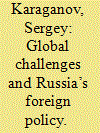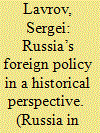| Srl | Item |
| 1 |
ID:
184554


|
|
|
|
|
| Summary/Abstract |
In 2021, Russia’s foreign policy seems to have entered a new stage.
Let us call it the “constructive destruction” of the previous model of
relations with the West. Elements of this policy kept piling up for
some fifteen years, approximately since Vladimir Putin’s well-known
speech in Munich in 2007. But residual attempts to fit into the Western
system with a defensive approach still prevailed in politics and rhetoric.
Constructive destruction is not aggressive. Russia is not going
to attack or destabilize anyone.
|
|
|
|
|
|
|
|
|
|
|
|
|
|
|
|
| 2 |
ID:
148714


|
|
|
|
|
| Summary/Abstract |
The article discusses the results of Russian foreign policy since the collapse of the Soviet Union against the background of major new global and regional international trends and the policy of other major world powers. The author argues that Russia should work for preventing a new structured confrontation in Europe, maintaining international stability, and keeping the world from sliding into a big war which seems to be more likely now than ever before in the last 50 years. At the same time it should join forces with China, India, Iran and other major non-Western players in building a community of cooperation, development and security for Greater Eurasia, open to the world and serving as one of the pillars of its stable and peaceful development. The world is changing incredibly fast and precariously. Russia must occupy a leading place in this world by moving towards economic growth and playing a key role in preventing a new world war, supporting global strategic stability and building or rebuilding international cooperation and security structures for the decade to come.
|
|
|
|
|
|
|
|
|
|
|
|
|
|
|
|
| 3 |
ID:
142903


|
|
|
|
|
| Summary/Abstract |
The article analyses Russia’s perceptions of, and attitudes to the developments in and around Kosovo, as well as their implications for Russia’s foreign and security policy-thinking and policy-making. It is argued that the Kosovo crisis has influenced Russia’s ideas on its relations with the outside world in a more fundamental way than any other event during the last decade. Russia’s policy during the crisis and Russia’s involvement in the crisis management are considered. The ongoing reassessment of Russia’s national interests in the light of the Kosovo crisis might have a significant impact on the major lines of Russia’s foreign and security policy, especially with respect to such issues as the role of military factors and the use of force. In particular, there may be substantive links between the case of Kosovo and the war in Chechnya. However, although comments in Russia about the performance of NATO-led conflict settlement in Kosovo are becoming increasingly sceptical, the issue seems to be overshadowed by new foreign policy lines associated with the change in the political leadership in Moscow.
|
|
|
|
|
|
|
|
|
|
|
|
|
|
|
|
| 4 |
ID:
146681


|
|
|
|
|
| Summary/Abstract |
Russia’s predominantly suspicious and even negative attitudes toward R2P are closely related to its traditional attachment to the notion of sovereignty, but its reluctance to ‘bless’ the use of force with R2P also serves as a pretext to cover various instrumental goals. Russia’s more assertive foreign policy has exacerbated this trend. Disagreements stem from differences between Russia and the West both in their conceptual approaches to security and in their assessments of specific cases. In particular, Russia has an existential concern over possible application of R2P by extra-regional actors in its immediate post-Soviet vicinity. However, in the conflicts around South Ossetia (2008) and Crimea / Southeastern Ukraine (2014-), there was a noticeable trend to refocus R2P-related arguments in support of Russia’s own actions. By and large, R2P continues to be perceived as a Western attempt to establish certain rules of behaviour which require caution and prudence. Nevertheless, more positive attitudes do not seem impossible. To play a prominent role in the evolving international system, Russia will have to make the R2P segment of its foreign policy more salient and overcome the lag in promoting this concept as a working tool indispensable for cooperative and responsible leadership.
|
|
|
|
|
|
|
|
|
|
|
|
|
|
|
|
| 5 |
ID:
161037


|
|
|
|
|
| Summary/Abstract |
As international relations go through a period of turbulence, Russia, as many times before, has found itself at a crossroads of key trends that will determine the direction of global development in the future.
|
|
|
|
|
|
|
|
|
|
|
|
|
|
|
|
| 6 |
ID:
155274


|
|
|
|
|
| Summary/Abstract |
Russia’s foreign policy decisions towards Ukraine in the context of the “Ukraine crisis” have been portrayed largely in a negative light which crudely paints Russia’s actions as being imperialistic, evil and largely irrational. This article argues that by looking at the interplay of identity and perceptions at the foreign policymaking level, Russia’s actions in Ukraine can be, to some degree, rationalized. First, Russia’s Eurasian–oriented great power role identity and its perceptions of Ukraine as represent a vital national interest. Second, the European Union and the United States are perceived as embodying a Western team of anti-Russian imperialists, which led Moscow to pursue hazardous foreign policies.
|
|
|
|
|
|
|
|
|
|
|
|
|
|
|
|